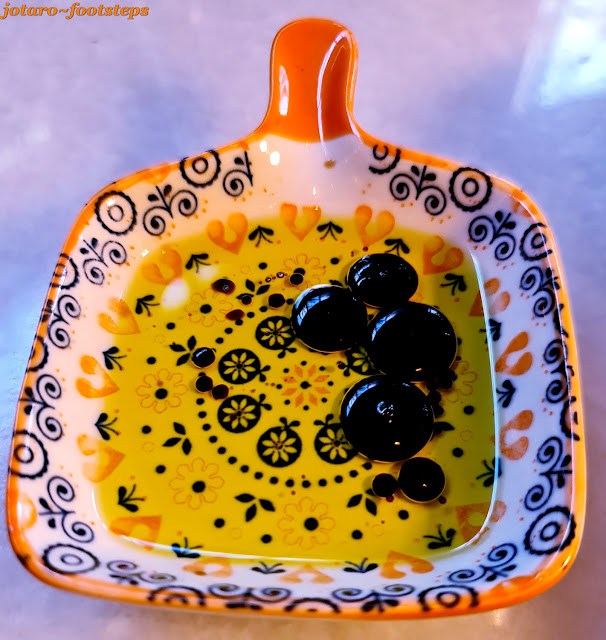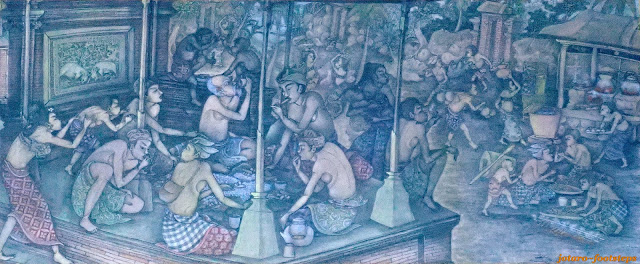You are at - Jotaro's Blog / FootSteps / YummY! / Western & Fusion Food / Spanish Tapas @ Bocado Kuala Lumpur
YummY!
Jotaro's Food Review
Spanish Tapas @ Bocado Kuala Lumpur
Kuala Lumpur, Malaysia - October 2022
During our 2019 cycling tour in Portugal & Spain we got to savour very good tapas, especially those from Restaurante Casa Pepe at Alcalá la Real. We even got to try tasty and artistic pinchos in Barcelona! After that pleasant experience, back home we were always on the look out for good tapas places! Now we got to try a nice spread at Mercat Barcelona and very good ones at Elli Rocks in TTDI!
This time round Lynne (the missus) had scouted out another tapas joint at Bocado, in Damansara Heights. It's entrance of a white-washed arched was a welcome that brought us back to our cycling tour of Zuheros with its white Pueblos Blanco of Andalusia region!
The moment we sat down a couple of glasses of White Sangria were there to welcome us; complimentary from the restaurant. It's light flavours tickled our palate and hinted of stronger things to come!
Kicking off with buttered toasts served with a dipping sauce of balsamic vinegar & olive oil.
Love this dip, and also love the bright and cheery Talavera tableware sauce plate it was served in!
Our first tapas was a simple one - rollitos berenjena - eggplant rolls!
It's a wonder how they have managed to roll a soft eggplant and have it infill with cheese! A nice soft start with slight crispiness which goes very well with the tomato puree and aged cheese that comes with it. I always like grilled eggplant, which bring out a musky flavour of the innocent vegetable.
It's a wonder how they have managed to roll a soft eggplant and have it infill with cheese! A nice soft start with slight crispiness which goes very well with the tomato puree and aged cheese that comes with it. I always like grilled eggplant, which bring out a musky flavour of the innocent vegetable.
These Croquetas don't look that fanciful but one bite into them and one will be hooked. A vegetarian tapas, these were made from fried mushrooms cooked with Béchamel making its creamy inside. I love this, biting into them slowly to feel the crunchiness of the bread crumbed skin and then slowly letting the juicy inside flow into my palate!
And a couple of red Sangria to celebrate the mood - it was an early birthday celebration for my better half 😄.
Do note that they have a stronger version called Sangaree, that also includes cognac, vermouth, etc. in its concoction; so do order the right one, pricing differs.
Something meaty - Chorizo Papas i.e. chorizo sausages stir-fried with small chunks of potatoes. As the sausages have been cut into smaller piece, the flavour of their air-dried meat have oozed out into the dish and the potatoes have absorbed this flavours beautifully.
Other than potatoes the dish have been cooked with slices of onions together with other spices to add more spunk to it. Chorizos are sausages made from of pork cured meat and get their smokiness and deep red color from being dried, smoked, and cured with red peppers (pimentón/pimentão).
In between bites do admire the blue Azulejo Ceramic Tiles hanging from some of the walls. Azulejo is a form of Portuguese and Spanish painted tin-glazed ceramic tilework.
Azulejo are found on the interior and exterior of churches, palaces, ordinary houses, schools, and nowadays, restaurants, bars and even railways or subway stations - some of the nices we saw were at the Obidos Railway Station during our cycling tour of Portugal & Spain. It's a station that's hardly used, deserted in fact and most train passengers don't disembark here seeing that it's very close to Lisbon. Most will take a day trip from Lisbon.
And a surpise for us, the big man himself, Chef Ignasi Prats ..... perhaps I was asking too many questions and he most kindly came out to answer my inquisitiveness! He's a Catalan from Barcelona and was most pleased to hear about our cycling tour in Spain and Barcelona! Getting to know the chef does have it's little perks, one will see why later on!
And comes the most beautiful dish for the evening - Piquillos con Brandada. It's smoked Piquillo pepper (red peper) filled with cod brandade, i.e. slow-cooked cod with mash potato. The slightly salty cod meld well with the bland potatoes in the Brandade. The bright red Piquillo were selected bigger ones with their bases cut of they looked standing there like hot volcanoes ready to erupt! Although looking red hot, they were not that spicy - it's the next dish that would add a strong sting!.
These Padrón peppers dish should be taken as a starter to spice up the palate for more invigorating tapas to come! We had ordered it later, but nevertheless, it was a most welcomed dish. The taste is mild, but some can be quite hot. Drought-stressed plants tend to produce hotter peppers - we bit into the larger one seen on top and was treated to a hot lashing, burning our tongue. Seems like the stressed pepper has stressed our palate! But it was a welcomed feeling that added to our Spanish culinary adventure! Like several other peppers. Padrón peppers become spicier as they mature, their ripe colour is red.
Padrón peppers are customarily fried in olive oil until the skin starts to blister and the pepper collapses. Padrón peppers originate from the municipality of Padrón in the province of Coruña, Galicia, northwestern Spain.
Okay, these Marinated Olives served almost at the end of our meal, are usually served a the start as an appetizer in Spain. No fault of the restaurant here - it's not on their menu and are usually used as a condiment in their cooking!
Chef Ignasi hearing us request for these, had kindly served it to us a an individual dish, soaked in olive oil. Although there were just the two of us and we did not order much, his personalized touch has warmed our hearts.
A fitting end to our dinner - Churros served as a birthday cake! And the missus was happily most surprised.
The churros here are one of the better ones I have tried locally, crispy on the outside and fluffy soft on the inside. They were served with three dip sauces: Pistachio Creme Anglaise (the lightly creamy creme anglaise had infused with pistachio paste, making it more interesting); chocolate sauce (the regular sauce served with Churros), and berries-marmalade sauce (sweet berries combo with the tanginess of marmalade). My favourite was the pistachio cream!
___________________________________________________________________________
Bocado's Mains Menu 01 (From the Josper Oven)
Bocado's Mains Menu 02 (From the Josper Oven)
Various sauces available including Chimichurri, Española, A la Pimienta and Salsa Béarnaise.
Below are their Drinks Menu
(Click here for online Bocado's Drinks Menu)
(Click here for online Bocado's Drinks Menu)
Bocado's Cocktails Menu
Bocado's Mocktails Menu
BOCADO KUALA LUMPUR
Ground Floor, Bangunan ECM Libra, 8, Jalan Damansara Endah, Bukit Damansara
50490 Kuala Lumpur, Wilayah Persekutuan Kuala Lumpur
Tel: +6012-9233206
Online Reservations: https://letsumai.com/bocado
Webpage: www.bocadokl.com
Facebook: www.facebook.com/bocadokl
Instagram: www.instagram.com/bocadokl
Email: info@bocadokl.com
Hours: 12:00pm-12:00am (Everyday)
GPS & Directional Map: 3.14990, 101.66511
(Click here for Google Street View)
___________________________________________________________________________
___________________________________________________________________________________
Related / Similar Blogs:
 |
Pinchos are delicious tapas found in northern Spain, and Els Pinxus have elevated them into an art-form; not to be missed when in Barcelona - Sant Gervasi-Galvany, Barcelona, Spain. |
___________________________________________________________________________________
You may also like:
 |
| Malaysia - KevinTheBigCity Tattoos, Kuala Lumpur : July 2014 A look at a young man's simple but meaningful tattoos |
 |
| Kuala Lumpur Kampung Batu Street Art : December 2020 The city's street art scene has reached to Kampung Batu, an unlikely and usually un-arsty commercial suburb. |
You are at - Jotaro's Blog / FootSteps / YummY! / Western & Fusion Food / Spanish Tapas @ Bocado Kuala Lumpur
If you like this, view my other blogs at Jotaro's Blog
(comments most welcomed. if you like this pls share via facebook or twitter)
























































































